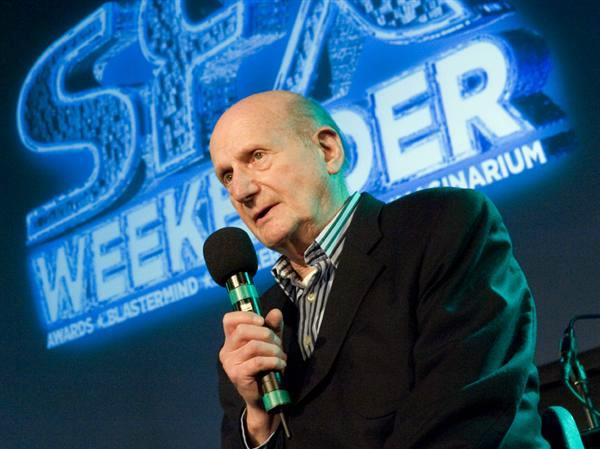Gerry Anderson, the legendary sci-fi creator behind more nostalgia-fuelling shows than possibly any other individual ever, sadly passed away yesterday, aged 83.

Anderson, whose most famous shows included the marionette-starring Stingray , Thunderbirds and Captain Scarlet , as well as live action shows such as UFO , Space: 1999 and The Protectors , entertained audiences for at least five generations from his first TV hit The Adventures Of Twizzle in 1957 to the revamped (and highly impressive) CG version of Captain Scarlet in 2005.
His son Jamie Anderson announced the news on his website , saying his father died peacefully in his sleep at noon on Wednesday. Anderson had suffered from Alzheimer's since 2010 and the disease had worsened in recent months, his son Jamie said.
SFX is deeply saddened by this news and our wishes are with Gerry Anderson’s family and close friends. Thank you, Gerry for so, so many great memories. And for some of the greatest acronyms ever invented.
Anderson was always a delight to interview with a sly sense of humour and some fast-held views and opinions. He was a great supporter of our events and the magazine, and we spoke with him a number of times. We’re proud to have awarded him a lifetime achievement award at one of the SFX Weekenders where he graciously turned up to receive and charm the crowds.
As a tribute, we’re reposting one of our final interviews with him from 2009. It concentrates on Fireball XL-5 but offers some wonderful insights into how he created his shows and also details some wonderful projects which sadly we will now never get to see. We really wish we did have £8 million to spare…
Anderson, cheekily drops this bombshell as he chats to SFX about the release of a special edition boxset of his 1962 show Fireball XL5 . “I’m working on a new show called A Christmas Miracle ,” he reveals. “It's a science fiction Christmas story, with character designs by artist Rodney Mathews . It’s going to be CGI. I'm very excited about it, but unfortunately I didn't think about this before the recession. So everybody I talk to, I’m asking... well, I'm thinking about you now. Maybe you've got $8 million tucked away somewhere you could invest?”
Sign up to the SFX Newsletter
Get sneak previews, exclusive competitions and details of special events each month!

Sadly, no. Not likely on an SFX wage. But I assure him that I'll ask around. "Just don’t take too big a cut yourself for making the introduction,” he deadpans.
"They've had one of the episodes colourised,” he enthuses. “Now, I’ve seen some of the earlier attempts at colourising, and I thought, ‘Blimey… not very good!’ This one that they’ve done – which has taken a long time and cost a fortune – looks brilliant. Absolutely brilliant. I have never been one of these people who say, ‘If something's been shot in black and white then it shouldn’t be in colour; it's made in black and white for a reason.’ Well the only reason Fireball XL5 was made in black and white was because we didn't have colour. And also, I feel that people who feel that way, no problem: it's available in black and white. It's there for them.”
Is it tempting, though, in this age of CG FX to go even further, and paint out all the wires from his puppet shows? “I don't think it's practical, cost wise. And I'm not quite sure how the puppets would look. I think it might be quite comical. If you've got wires, you know why they're walking with a peculiar gait. If you take the wires out, then I think people would think – instead of ‘Great, there's no wires!’ – they'd be thinking, ‘That's a bloody funny walk he's got!” So I think it might be counterproductive as well as being horrendously expensive.”
“Some of the early shows, when I'm forced to watch them… when I say forced to watch, I mean that I'm someone who's always thinking of tomorrow, so I tend to turn my back on what I've made. But then, sometimes, there's a reason, rather like with Fireball now, that I have to look at one and remind myself. And I look at them and think, ‘Christ, that was really quite amazing for the time that it was made.’”
Back in the present, Anderson is still hoping there’s life in his excellent CG version of Captain Scarlet . “We are in the talking stages of talking to a new American distributor, and hopefully we'll be signing in a week or two. And then it might start all over again. And if it takes off in America, it could become a big hit.”
Then, of course, there’s the big screen version of his ’70s live action show, UFO. “I was told about that by ITV America, by a very thoughtful person who phoned me and said, ‘Gerry we've acquired the rights to remake UFO, and I didn't want you to get a shock and suddenly read the press announcement. So I'm ringing you to forewarn you.’ Which was a very kind thing to do. It's going to be a very big picture. It's got a lot of very talented people involved. And they've talked about the possibility of me being an advisor on the picture. That really is as far as we've got. And I'd like to think that I could help them, because a lot of remakes don't live up to the original. So I would like to be involved. Not to interfere I know too much about the creative process to interfere, that puts people off. But just internal chats to express my views, and people can take it, or leave it, or modify it. Hopefully, it might dribble through...”
So hopefully, it’ll be a better experience for than the Thunderbirds movie, on which he wasn’t consulted at all. “The Thunderbirds movie, and you can print this, I thought was an utter load of crap. Universal Pictures had learned during the production that people were constantly asking, ‘Well, why isn't Gerry involved?’ And just before the premiere – a couple of weeks before the premiere – they offered me three quarters of a million dollars to attend the premiere and help them promote the picture. And I turned it down. I could have done with money, but I couldn't bring myself to become a prostitute.”

SFX Magazine is the world's number one sci-fi, fantasy, and horror magazine published by Future PLC. Established in 1995, SFX Magazine prides itself on writing for its fans, welcoming geeks, collectors, and aficionados into its readership for over 25 years. Covering films, TV shows, books, comics, games, merch, and more, SFX Magazine is published every month. If you love it, chances are we do too and you'll find it in SFX.


